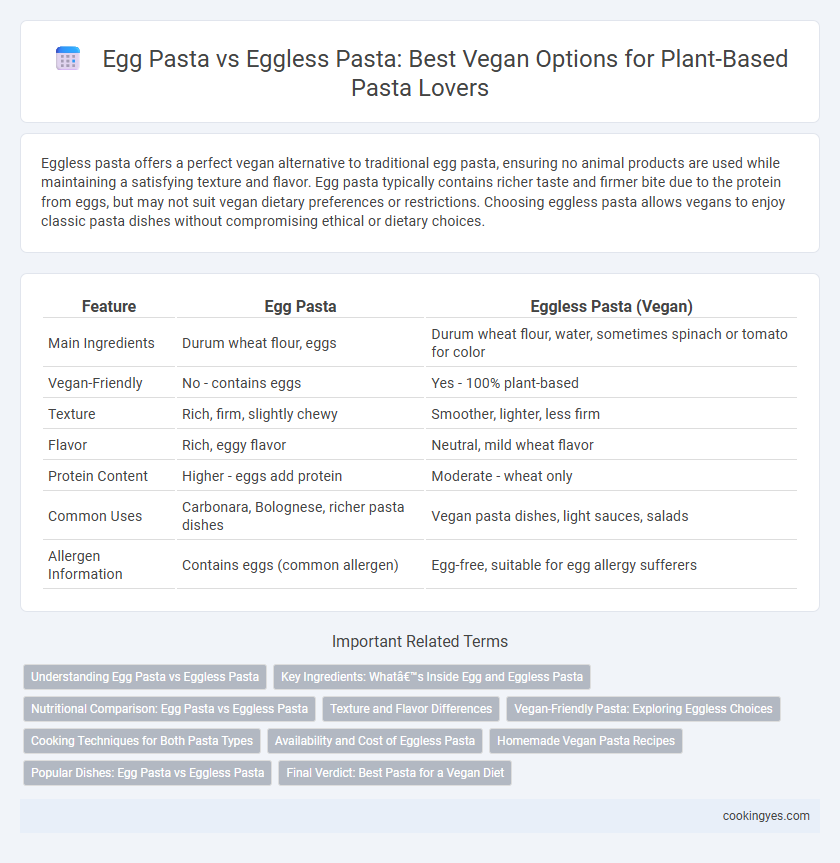Eggless pasta offers a perfect vegan alternative to traditional egg pasta, ensuring no animal products are used while maintaining a satisfying texture and flavor. Egg pasta typically contains richer taste and firmer bite due to the protein from eggs, but may not suit vegan dietary preferences or restrictions. Choosing eggless pasta allows vegans to enjoy classic pasta dishes without compromising ethical or dietary choices.
Table of Comparison
| Feature | Egg Pasta | Eggless Pasta (Vegan) |
|---|---|---|
| Main Ingredients | Durum wheat flour, eggs | Durum wheat flour, water, sometimes spinach or tomato for color |
| Vegan-Friendly | No - contains eggs | Yes - 100% plant-based |
| Texture | Rich, firm, slightly chewy | Smoother, lighter, less firm |
| Flavor | Rich, eggy flavor | Neutral, mild wheat flavor |
| Protein Content | Higher - eggs add protein | Moderate - wheat only |
| Common Uses | Carbonara, Bolognese, richer pasta dishes | Vegan pasta dishes, light sauces, salads |
| Allergen Information | Contains eggs (common allergen) | Egg-free, suitable for egg allergy sufferers |
Understanding Egg Pasta vs Eggless Pasta
Egg pasta contains eggs, providing a richer texture and higher protein content compared to eggless pasta, which is made solely from flour and water, making it suitable for vegans. Eggless pasta options such as those made from wheat, rice, or legume flours offer a plant-based alternative, ensuring compliance with vegan dietary restrictions. Understanding the ingredient differences helps consumers select pasta that aligns with nutritional needs and ethical preferences.
Key Ingredients: What’s Inside Egg and Eggless Pasta
Egg pasta contains wheat flour and whole eggs, providing a rich texture and higher protein content, while eggless pasta is made primarily from semolina or durum wheat flour mixed with water, making it suitable for vegan diets. The key difference lies in the presence of eggs, which adds moisture and elasticity to the dough but excludes vegans, hence eggless pasta offers a plant-based alternative without compromising on structure. Both types maintain essential carbohydrates but differ in protein and fat profiles due to the inclusion or absence of eggs.
Nutritional Comparison: Egg Pasta vs Eggless Pasta
Egg pasta contains higher protein content and essential amino acids due to the inclusion of eggs, enriching its nutritional profile. Eggless pasta, typically made from flour and water or plant-based ingredients, offers lower cholesterol and saturated fat levels, making it suitable for vegan diets. Both types provide carbohydrates and energy, but eggless pasta aligns better with ethical and health-conscious choices related to veganism.
Texture and Flavor Differences
Egg pasta offers a richer, firmer texture and a slightly buttery flavor due to the protein and fat content from eggs, creating a more elastic dough that holds sauces well. Eggless pasta, typically made from wheat and water or with added vegetable purees, presents a lighter, more neutral taste and a firmer bite, making it ideal for vegan diets without compromising structure. Texture-wise, eggless pasta tends to be less tender and more al dente, enhancing its suitability for heartier, robust sauces in vegan cuisine.
Vegan-Friendly Pasta: Exploring Eggless Choices
Eggless pasta varieties prioritize plant-based ingredients such as durum wheat semolina and water, making them ideal for vegan diets that exclude animal products. Unlike traditional egg pasta, which contains egg whites and yolks, eggless pasta maintains the same texture and flavor while catering to ethical and dietary restrictions. Popular eggless pasta options include spaghetti, penne, and fusilli, all easily found in vegan-certified brands and supermarkets.
Cooking Techniques for Both Pasta Types
Egg pasta requires careful boiling in well-salted water to maintain its delicate texture and prevent overcooking, while eggless pasta, often made from durum wheat semolina, demands a slightly longer cooking time to achieve the ideal al dente consistency. Stirring egg pasta gently during the initial minutes of cooking prevents clumping, whereas eggless pasta benefits from vigorous stirring to keep strands separate. For both types, draining immediately and rinsing eggless pasta under cold water helps retain firmness and removes excess starch, making them perfect for vegan and non-vegan recipes alike.
Availability and Cost of Eggless Pasta
Eggless pasta, widely available in grocery stores and specialty vegan shops, offers an affordable alternative for plant-based diets compared to traditional egg pasta. Its cost is generally lower due to the absence of eggs, which reduces production expenses and appeals to budget-conscious consumers. Vegan-friendly brands continue to expand their eggless pasta varieties, increasing accessibility and competitive pricing in the market.
Homemade Vegan Pasta Recipes
Homemade vegan pasta recipes prioritize eggless pasta to accommodate plant-based diets while maintaining texture and flavor through alternatives like aquafaba or mashed potatoes. Eggless pasta offers a cruelty-free, cholesterol-free option that aligns with vegan nutritional needs, providing a versatile base for diverse sauces and seasonings. Crafting fresh eggless pasta at home enhances control over ingredients, ensuring allergen-free, wholesome meals tailored to vegan lifestyles.
Popular Dishes: Egg Pasta vs Eggless Pasta
Eggless pasta serves as a popular vegan alternative to traditional egg pasta, commonly used in dishes like vegan spaghetti carbonara and dairy-free fettuccine Alfredo. Egg pasta, rich in protein and texture, is favored in classic recipes such as tagliatelle alla Bolognese and ravioli stuffed with ricotta and spinach. Vegan-friendly meals highlight eggless pasta for its adaptability in dishes like vegan lasagna and creamy avocado pasta, maintaining flavor without animal products.
Final Verdict: Best Pasta for a Vegan Diet
Eggless pasta stands as the best choice for a vegan diet due to its purely plant-based ingredients, ensuring no animal products are consumed. Unlike traditional egg pasta, which contains eggs and therefore excludes vegans, eggless pasta varieties often use semolina, water, and sometimes spinach or tomato for added nutrition and flavor. Selecting eggless pasta guarantees adherence to vegan dietary principles without compromising taste or texture.
Egg pasta vs eggless pasta for vegan options Infographic

 cookingyes.com
cookingyes.com